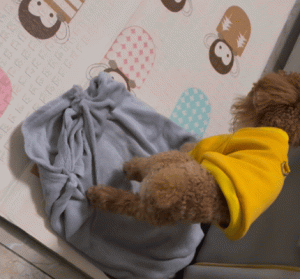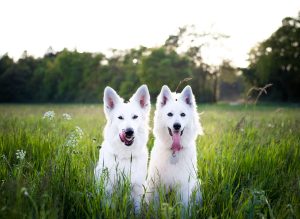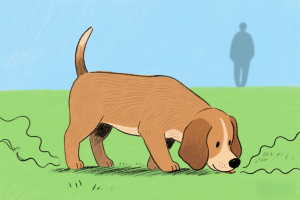Many pet owners have had dogs for a long time, but perhaps few have really thought about this: whether the puppy came from a pet store or a friend’s home, the moment an excited owner scoops it up and takes it home, the puppy is leaving its mother for good. Once a puppy is separated from its mother, it embarks on a unique emotional journey. What changes will it experience next?
-
Frequent Whining
When a puppy realizes its familiar mother is gone, its first reaction is to cry out. Many dog owners might suddenly understand: “Ah, no wonder the puppy kept whining nonstop during the first few days at home—it was looking for its mom.” Puppies entering a new home often scream frequently because they feel anxious. Their barks are calls for their mother: “Woof woof, Mom, where are you? I can’t find you, I’m so scared~” Especially at night, without the familiar scent and warmth of their mother, puppies feel even more unsettled, and their cries become louder. The troublesome nighttime barking often occurs during this period. At this point, the puppy is still hopeful, imagining that its mother has only temporarily left and will come back for it.
-
Start Sniffing Around Constantly
After calling for a while without finding its mother, the puppy begins to wander cautiously, sniffing continuously. This is its persistence, trying to track down its mother’s scent—the most comforting smell in its memory. It explores the entire house, only to find that the mother’s scent is nowhere to be found. Its eyes often lose their sparkle, and its little tail stops wagging cheerfully. The previously lively puppy may curl up in a corner, motionless, immersed in the sadness of losing its mother. By now, it has likely realized that its mother is truly gone.
-
Loss of Appetite
Once the puppy comes to terms with the fact that its mother will not return, it may become listless. At least 30%–40% of young puppies will show a reduced appetite. Normally, a puppy would excitedly run over when food appears, but now, even delicious treats fail to spark much interest. It may sniff lazily, lick a few bites, and then bury its head in its paws again. Its longing for its mother can even outweigh the appeal of food.

-
Heightened Sensitivity to New Things
The puppy may also become timid and extremely sensitive to its new surroundings. Sudden sounds or movements can startle it. The normally playful puppy loses its curiosity about new things, with its once-curious gaze turning wary and distant. Even minor noises can frighten it. Loud sounds from the TV or phone, especially war scenes or harsh background music, may make the puppy curl up in fear and even tremble.
-
Vitality and Adaptation Begin to Emerge
However, a puppy’s vitality and adaptability quietly begin to take effect. Over time, it gradually realizes that its mother will not return, and that the new environment and owner are not so frightening. It cautiously accepts the food and affection offered by its new owner. Gentle touches and soothing words slowly seep into its heart. Its tail may wag lightly in response. The puppy begins exploring its new nest, first sniffing around the immediate area to familiarize itself with every corner, then gradually expanding its range. Slowly, it learns to find joy in the new environment, chasing sunlit shadows or playing with new companions. Its lively nature begins to return.
-
Love and Companionship
Leaving its mother marks a profound emotional transformation for the puppy. It experiences the pain and confusion of loss, but in the process gains growth and independence. It learns to adapt to a new environment, trust its new owner, and face life bravely without its mother’s protection. Though this journey is full of challenges and tears, it builds resilience. The puppy is no longer a fragile life that depends solely on its mother; it gradually grows into a self-reliant little dog. From then on, it will accompany you, creating a beautiful journey together for many years. It will be incredibly loyal and never betray your trust.





